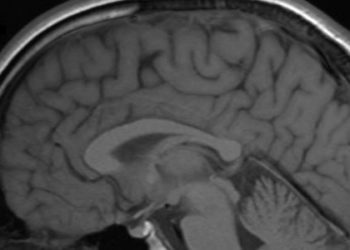Clinical scale, clinician suspicion poorly predict serious infections
1. In a prospective study of febrile full term infants 60 or fewer days old, neither the Yale Observation Scale (YOS) score nor unstructured clinician suspicion reliably identified infants with serious bacterial infections.
2. A YOS score < 10 had a high negative predictive value for serious bacterial infections, and even higher negative predictive value for invasive bacterial infections.
Evidence Rating Level: 1 (Excellent)
Study Rundown: The most common reason an infant presents to the emergency department is fever. Of infants under 2 months of age who present with fever, 5 to 10% have serious bacterial infections. Despite extensive research, reliably identifying and treating febrile infants who are most likely suffering from serious bacterial infection is an ongoing challenge. This study assessed the sensitivity of the Yale Observation Scale (YOS) and compared its reliability to clinician suspicion in diagnosing serious bacterial infections (SBIs) in febrile infants 2 months of age or younger. Of those studied, almost 1 in 10 infants with YOS scores < 10 were found to have SBI (UTI, bacteremia, bacterial meningitis), and almost 2 out of every 100 were found to have invasive bacterial infection (bacteremia, bacterial meningitis). Over 5% of infants with clinician suspicion <1% were found to have SBI, and 1 out of 100 had invasive bacterial infection. Neither test was found to reliably identify infants with invasive bacterial infections or SBI. The results of this study emphasize the need for more accurate predictors of SBI among febrile infants to improve risk stratification. While this study underscores this urgency, it is limited by the exclusion of critically ill appearing infants.
Click to read the study in Pediatrics
Relevant Reading: Failure of infant observation scales in detecting serious illness in febrile, 4- to 8- week-old infants
In-Depth [prospective cohort study]: This study included 4591 febrile infants (mean age = 32.0 days, 56.5% male) less than or equal to 2 months in age, who presented to 1 of 26 emergency departments participating in the Febrile Infant Working Group of the Pediatric Emergency Care Applied Research Network (PECARN) between December 2008 and May 2013. Participating physicians received standardized training in applying the YOS scale, which utilized 6 observed behavioral domains and assigned infants a score from 6 (most well-appearing) to 30 (most ill-appearing). The same physicians were also asked to use their judgment and select 1 of 5 risk categories for SBI: <1%, 1-5%, 6-11%, 11-50% or >50%, which were described as “unstructured clinician suspicion”. Overall, infants with SBIs had similar median YOS scores compared to those without SBIs. Of 4058 infants with normal YOS scores, 9.6% had SBIs (n= 388), for a sensitivity of 11.6% and a negative predictive value (NPV) of 90.4%. Seventy-two infants with normal YOS scores had invasive bacterial infection, for a sensitivity of 24.2% and an NPV of 98.2%. Of infants with lowest clinician suspicion of SBI, 6.4% (n=106) had SBI and 1% (n=16) had invasive bacterial infections. YOS score did not discriminate between infants with or without SBI (area under the curve [AUC] 0.53, 95%CI 0.50-0.55), and had moderate ability to identify infants with invasive bacterial infection (AUC 0.61, 95% CI 0.56-0.67). Similarly, clinician suspicion had a modest ability to identify infants with SBI or invasive bacterial infection (AUC 0.61, 95% CI 0.58-0.63 and AUC 0.66, 95% CI 0.61-0.72, respectively). Neither assessment tool identified all 24 infants with true bacterial meningitis. On the contrary, 37.5% of infants with bacterial meningitis had a YOS score of 6.
Image: CC/Wiki/Nevit Dilmen
©2017 2 Minute Medicine, Inc. All rights reserved. No works may be reproduced without expressed written consent from 2 Minute Medicine, Inc. Inquire about licensing here. No article should be construed as medical advice and is not intended as such by the authors or by 2 Minute Medicine, Inc.







